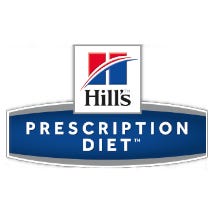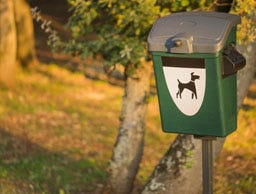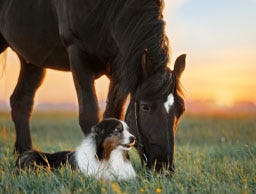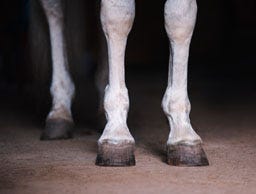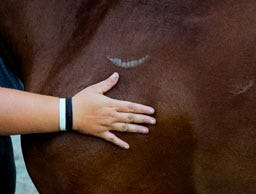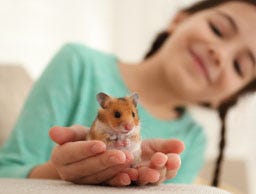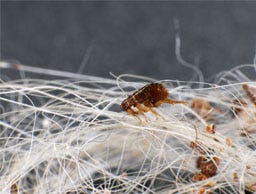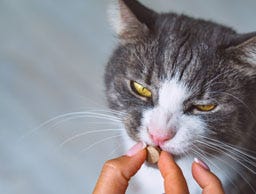Spring Safety Tips for Pets
We all love it when winter finally gives way to spring, and we can spend more time outside exploring with our pets. But springtime isn’t all flowers and sunshine. Several dangers crop up this time of year that can pose a real threat to your pet if not correctly handled, so make sure you're prepared for spring with our guide to spring dangers.
Common Spring Dangers


Parasites
Parasites are a year-round problem, but spring poses a higher risk of your pet picking something up as they spend more time outside. Many parasites hop or fall onto your pet’s coat while you’re out exploring, and that’s all it takes for an infestation to take hold. Plus, with so many new smells, pets become more curious this time of year, and you may find they eat things they shouldn’t or drink from outdoor water sources that could be rife with parasites like worms.
To ensure your pet is protected against parasites, remember to stay up to date with their routine flea and worming treatments so both of you can enjoy the time outside without worrying about parasites.
Seasonal Allergies
Pollen counts can vary across the country, but it doesn’t take much time to start allergic reactions. Spring is just the start of allergy season! Keep an eye out for the signs of allergies in pets, which can include:
- Coughing or sneezing
- Itchy, dry or inflamed skin
- Runny or stuffy nose
- Facial pain
- Watery, red or itchy eyes.
The best way to help pets with allergies is to avoid the allergens that cause flare-ups, whether pollen, mould, dust, or even their food. Some allergens, however, are unavoidable, especially for dogs that need long walks, so look at some of our top cat and dog allergy treatments to find the solution to your pet's symptoms.
Weed Killer
Many weed killers and other garden maintenance chemicals can harm pets if ingested, sniffed, or even stepped on. Given how dogs, in particular, like to sniff and dig around in the dirt, this can be a real risk to your pet. Always read the instructions and safety information on any garden chemicals you’re using to make sure they’re safe for use around pets.
Some of the key ingredients to avoid include:
- Glyphosate
- Disulfoton
- Sodium Arsenite
- Metaldehyde
- Ammonium Sulfamate
- Borax
- And more!
Even if you don’t have pets in your garden, we’d always recommend using pet-friendly garden chemicals in case any wildlife or exploring cats venture through your garden. Also, be aware of the signs of herbicide poisoning in dogs and cats, which include:
- Burns
- Sores
- Rashes
- Vomiting
- Diarrhoea
If you think your pet might be showing signs of weed killer poisoning, call your vet immediately or contact the Animal Poison Line at 01202 509000. They are run by the Veterinary Poisons Information Service (VPIS). They are the only 24-hour specialised emergency telephone service in the UK dedicated to helping owners whose pets may have eaten or come into contact with something toxic.
Toxic Plants to Dogs and Cats
April is the start of peak gardening season, and there’s nothing wrong with wanting to cultivate a beautiful garden full of plants and flowers, even if you have pets. Just ensure that those you’re planting are safe for pets to sniff or eat. Even the best-trained pets might sneak a nibble when you're not looking, and it’s always better to be safe than sorry!
Try to avoid having the following in your garden:
- Daffodils
- Tulips
- Lilies
- Bluebells
- Azaleas
- Crocuses
- And more.
Some popular pet-safe plants for pets include the following:
- Roses
- African Violets
- Snapdragons
- Orchids
- Pansies
- Petunias
- And more!
No one should have to choose between a beautiful garden and a healthy pet. Just always check the labels on any plants you want to buy to see if they’re safe, and if you’re unsure, ask a staff member for their advice.
Spring Cleaning Products
We all love to give our homes a little spruce in the spring, but you should always be wary of cleaning products and their suitability for use around animals. Make sure to check the label and ensure that none of the products contain any of the following:
- Ammonia
- Chlorine
- Phenol
- Bleach
- Benzalkonium chloride
- And more!
Instead, try to use natural and pet-friendly cleaning products. If you need to use chemicals to clean, keep them stored well out of your pet’s way and ensure they’re not in the room while using them. Keep the area where you’re cleaning well-ventilated, too, as some pets can have particularly sensitive respiratory systems, and the vapours given off by these products can be harmful as well.
Livestock and their Young
Our pets aren’t the only ones looking to make the most of the spring season. Around this time of year, you’ll see fields filling up with livestock and their young. Animals like sheep and cattle can be very protective of their young, and if your dog is off their leash, they can be at risk of being charged by protective mothers. Or, worse, your dog might think the animals running are game and chase them, which can cause a lot of distress for the livestock and even cost farmers some of their livelihood if any of them are hurt.
Make sure you’re cautious when walking your dog near livestock. Check fields before walking your dog through them, even if they have a public right of way, and keep them on a leash around livestock, even if you’re walking on a public right of way. And remember, just because you can’t see any baby animals in the field, it doesn’t mean your dog’s presence won’t be distressing for the animals that are. If any livestock is pregnant, the stress of being chased can cause several complications that can harm the animal and the farmer.
Spring doesn’t have to be dangerous, and by taking the proper precautions, you can ensure your pet remains happy and healthy no matter the season! If you want to find the best products to protect and care for your pet this spring, look through our fantastic collection of spring essentials, including allergy soothers, parasite prevention, and more!


This post is an opinion and should only be used as a guide. You should thoroughly discuss any change to your pet’s care or lifestyle with your vet before starting any program or treatment.
This post was written by a human.


